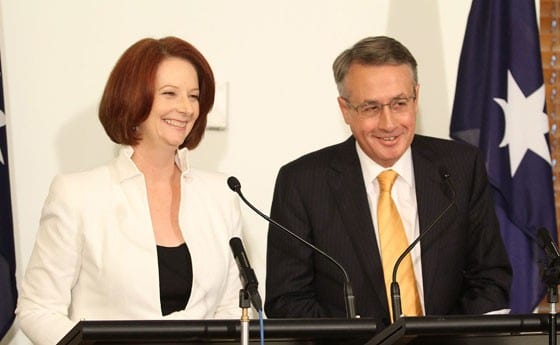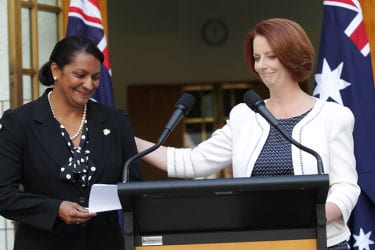When Julia Gillard became Australia’s first female prime minister in 2010 it seemed as though the country had smashed through the ultimate glass ceiling.
In the three years and two days since, Gillard has achieved some significant feats as the country’s first female PM. She passed a number of milestone reforms, created the benchmark for public defense of sexism, and fought back against internal party conflict.
We take a look at some of the most significant moments of our first female prime minister.
June 24 2010: Julia Gillard becomes Australia’s first female PM, ousting Kevin Rudd in the process.
August 2010: The 2010 federal election results in a hung parliament, Gillard secures the support of the Greens and three independent MPs to secure the leadership.
November 2011: The government passes Australia’s controversial clean living bill. The legislation called for polluting industries to be forced to pay for carbon emissions from July 1, 2012.
“Today we have made history. After all those years of debate and division, our nation has got the job done,” Gillard says.
Jan 26 2012: Her time as PM was characterised by much gender-focused commentary, and January 2012 brought along ‘shoe-gate’ when Gillard and Opposition Leader Tony Abbott were dragged from an Australia Day ceremony by security and Australian Federal Police because of fiery protests. Gillard lost her shoe in the fracas and the offending item and analysis of its style made front page news.
February 2012: Kevin Rudd finally removes himself from Gillard’s frontbench, resigning as foreign minister, and claiming a lack of support from Gillard.
February 27 2012: Gillard announces she’ll call a leadership spill on the morning of Monday February 27.
“If against my expectation I do not receive the support of my colleagues then I will go to the backbench and I will renounce any further ambition for the Labor leadership,” she said.
Gillard wins. Rudd says he will dedicate himself to “working fully” for Gillard’s re-election
March 2012: Gillard achieves a significant political milestone as the mining tax legislation passes through the Senate.
August 14 2012: Gillard adopts the Pacific Solution for asylum seekers.
August 23 2012: Gillard holds a fiery hour-long press conference to defend herself over allegations about her legal work with Australian Workers’ Union officials in the 1990s. She says she’s been repeatedly defamed by suggestions she set up a slush fund.
September 2012: Shock-jock Alan Jones fires up the public denigration of Gillard, quipping that the PM’s father “died of shame”. His comments follow earlier statements in which he urged her to be “thrown into a chuff bag” and that “women are destroying the joint”.
“Put her (Clover Moore, Lord Mayor of Sydney) in the same chaff bag as Julia Gillard and throw them both out to sea.”
The successive media storm calls for Jones to be dumped from 2GB and sees the formation of the social media campaign #destroythejoint
October 2012: Julia Gillard launches a global meme, delivering a scathing attack on the Opposition Leader during Question Time. During the 15 minute speech she accuses Abbott of being a misogynist and says the government “will not be lectured on sexism and misogyny by this man”.
“If he wants to know what misogyny looks like in modern Australia, he doesn’t need a motion in the House of Representatives, he needs a mirror.”
The speech becomes a global hit, with more than 2.3 million views on YouTube in several days. The speech is referred to as a “defining moment” for feminism in Australia
November 2012: Gillard announces a royal commission into child sex abuse crimes of the church.
January 2013: Ending speculation, Gillard uses a National Press Club address to put a date on the next federal election, September 14.
January 22 2013: Gillard announces her “captain’s pick” of Nova Peris as a senate candidate in the Northern Territory, sparking a bitter conflict in the ALP over the dumping of Trish Crossin.
February 2 2013: Gillard announces a party reshuffle after resignations of senior ministers Nicola Roxon and Chris Evans.
March 21 2013: Overriding the focus of Gillard’s national apology to Aboriginal mothers of forced adoptions, Simon Crean calls for Gillard to call a leadership spill.
Gillard agrees and calls for a spill of all leadership positions in the Labor party. Rudd doesn’t contest and Gillard remains PM.
April 14 2013: Gillard announces the Gonski education reforms, the reforms that were the “defining passion” of her life to lift schools funding, provided states agree. $2.3 billion will be taken from universities to pay for the reforms.
May 20 2013: Gillard’s National Disability Insurance Scheme (NDIS) policy, a program that will cost $15 billion a year, passes. Gillard is visibly emotional as she delivers a speech on the significance of the policy to parliament.
June 2013: Gillard contends with a number of public attacks, some coming in the form of flying sandwich’s. She faces significant sexist and derogatory attacks.
It started with the warning of the blue tie brigade. In an ill-advised election campaign, Gillard warns of a future with the ‘men in ‘blue ties’ leading the country and women’s rights becoming “political playthings”.
Later that week her words seemed to hold some merit following the release of a mock menu item featuring the “Julia Gillard Kentucky Fried Quail” associated with the Liberal party.
June 13 2013: Another shock jock has his go at publicly humiliating Gillard. Howard Sattler is suspended after his interview with Gillard in which he asks if her partner Tim Mathieson is gay.
June 21 2013: In another alleged ‘gender-vote’ tactic, Gillard appears in the July edition of the Australian Women’s Weekly, pictured knitting a stuffed kangaroo for the future Royal baby.
June 26 2013: Gillard calls a leadership spill, declaring that should she lose she will resign from politics. Rudd agrees to run.
Both commit to leaving federal politics if they are unsuccessful.
Kevin Rudd wins the ballot, 57 votes to 45.
Gillard delivers a calm and dignified farewell speech congratulating Kevin Rudd, outlining her key policy achievements and declaring she believes it’ll be “easier” for our next female PM.
She said there’s been a lot of speculation about her playing the so-called “gender card” because “heaven knows no one knew I was a woman before I mentioned it!”
“The reaction to being the first female prime minister does not explain everything about my prime ministership, not does it explain nothing about my prime minister,” she said.
What was the most significant moment of Gillard’s prime ministership for you? Let us know in the comments below.
In case you missed it, check out our live blog of all the action as it went down last night.










